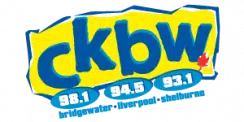This year CKBW celebrates 75 years.
It was during a snowstorm on Christmas Eve, December 24, 1947 when CKBW first officially signed on from their King Street, Bridgewater studios to start serving and entertaining the South Shore.
Here are some of the highlights of the past 75 years of CKBW broadcasting on the South Shore:
CKBW-FM, Bridgewater
Acadia Broadcasting Ltd.
| Station | Year | Freq. | Power | Owner/Info |
|---|---|---|---|---|
|
CKBW-FM
|
2003
|
98.1
|
32,000
|
Acadia Broadcasting Co. Ltd.
|
|
CKBW-AM
|
1947
|
1000
|
1,000
|
Acadia Broadcasting Co. Ltd.
|
1946
A licence was granted to the Acadia Broadcasting Co. for the operation of a new station at Bridgewater (1,000 watts on 1000 kHz). No call letters were yet assigned. The station would operate under the management of L. Rogers of Bridgewater, who expected the station to be on the air as soon as sufficient equipment could be installed.
1947
Manager John Hirtle announced the call letters CKBW had been assigned for his station. No opening date had yet been announced. For the record, Hirtle had worked in the past for CHNS Halifax. CKBW signed on the air on Christmas Eve with the official launch on December 27. The station operated with 1,000 watts of power at 1000 kHz on the dial. Studios were located on King Street and the transmitter was at Hebbville. CKBW was an affiliate of the CBC network. The “BW” represented the Bridgewater. Acadia Broadcasting was owned by Bridgewater businessmen Lester L. Rogers, Don Hill and John F. Hirtle. Hill sold his interest in
1952
Dorothy Oakes was no longer accountant and women’s editor. She had also hosted the program, “Listen Ladies to Dorothy Oakes”. She was 19 years old when the program began. The program had approximately 30,000 listeners from 10:00 to 10:30 a.m., Monday through Friday.
1955
Some of the staff: Raymond Snyder (transmitter operator), Vernon Mossmon (announcer), Lester Rogers (sales manager), Doug Hirtle (chief engineer), Max Ramey (program director), Jim Newell (commercial manager), Bob MacLaren (announcer), Vern Rodenhizer (announcer), Lloyd Griswold (chief transmitter operator). CKBW’s transmitter was at Hebbvile, on a 19 acre site. A forest fire hit the region on May 22 and the transmitter site was damaged. Both sources of power to the site failed, knocking the station off the air. Power was restored and CKBW broke in with emergency programming. The fire reached Bridgewater and studio power went off. The CKBW transmitter was linked up with CHNS Halifax with ‘BW staff feeding emergency info to the Halifax station to feed over both transmitters. CKBW returned to local operations as the fire died down.
1956
John F. Hirtle was elected president of the Atlantic Association of Broadcasters. Commercial manager Jim Newell left CKBW in October. Other staff and management at this time: Lester Rogers (sales manager), Jamie McLeod (station manager), Max Ramer (chief announcer), Douglas Hirtle (chief engineer). John Hirtle was president and general manager. Studios were located on King Street in Bridgewater.
1958
Slogan: Serving the wealthy South Shore.
1962
CKBW increased power to 10,000 watts. The Trans-Canada and Dominion networks were consolidated into a single CBC service. CKBW remained a CBC affiliate after the merger.
1967
The station moved to new studios and offices in the Bridgewater Plaza.
1969
Broadcast News was the main source of news for radio stations in Canada but only a handful at this time were subscribing to BN’s voice (audio) service. CKBW was one of those stations. Ed Boylan was news editor. Announcer Blain Henshaw was now also doing news. CKBW had a staff of 22.
1974
Lester Rogers and John Hirtle sold their interest in CKBW to four longtime employees: Jamie MacLeod (Station Manager), Bob MacLaren (Program Director), Bob Lowe (Sales Manager) and Doug Hirtle (Chief Engineer).
1978
Two Class A rebroadcasters were approved in principle for CKBW, to serve Shelburne and Liverpool. A frequency of 94.1 MHz was proposed. The Liverpool transmitter would have a power of 50,000 watts and would have some local programming.
1980
CKBW (“South Shore Radio”) received approval to operate rebroadcast transmitters at Liverpool (3,000 watts on 94.5 MHz) and Shelburne (3,000 watts on 93.1 MHz). The rebroadcasters went on the air later in the year. CKBW-FM-1 operated from Liverpool and CKBW-FM-2 broadcast from Shelburne. The main AM signal combined with the FM rebroadcasters gave CKBW a coverage area that extended from Halifax to Yarmouth. New Harris transmitters were used at both locations. Station owner Jamie MacLeod came up with a plan for a very sophisticated remote broadcasting system and it was put into place. The system consists of nine McMartin RPU transmitters which give reporters the ability to broadcast live from locations anywhere along the 100 mile coastline.
1982
On July 9, CKBW (including CKBW-FM-1 and CKBW-FM-2) was authorized to delete its CBC affiliation. CBC service was now available to the region via CBHL-FM.
1984
A power increase was granted for CKBW-FM-2 Shelburne, from 3,000 to 8,600 watts.
1986
On January 31, the CRTC approved the application to amend the licence for CKBW-FM-1 Liverpool by increasing the effective radiated power from 3,000 watts to 8,700 watts. The licensee indicated that the power increase would improve service to Queens County.
1989
In September, the CRTC gave the ok for New Brunswick Broadcasting Co. Ltd., controlled indirectly by the Irving family of Saint John, N.B., to acquire CKBW and its rebroadcast transmitters from Acadia Broadcasting Co. Ltd. Acadia was controlled by James A. MacLeod of Bridgewater (54.37%) who was involved with the station since its launch in 1947. Robert Lowe and Robert MacLaren owned 22.8% each. MacLaren, involved with CKBW for 37 years, would remain as station manager and continue to hold a seat on the Board of Directors. MacLeod and Lowe planned to retire. The CRTC was satisfied other Irving media did not penetrate the CKBW market.
2001
George Ferguson left CKBW and CHSJ (Saint John) where he was general manager. He led the company’s radio division in winning licences for CHWV Saint John and CHTD in St. Stephen. On October 17, CKBW was given approval to convert to the FM band, operating on 98.1 MHz with an effective radiated power of 32,000 watts. The existing country format would be retained.
2002
In late 2001 or early 2002, CKBW made the move from AM to FM. In February, CKBW switched from country to hot adult contemporary during the day and rock/contemporary hits at night.
2003
On January 1, New Brunswick Broadcasting Co. Ltd. and Acadia Broadcasting Co. Ltd. were amalgamated and continued under the name Acadia Broadcasting Ltd.
2005
On June 8 the CRTC approved a corporate reorganization resulting in the transfer of the ownership and effective control of Acadia Broadcasting Limited, licensee of CHSJ-FM and CHWV-FM Saint John (NB), CHTD-FM St. Stephen (NB), and CKBW-FM Bridgewater (NS), from Brunswick News Inc., a corporation indirectly owned and controlled by J.K. Irving, A.L. Irving and John E. Irving (Irving brothers), to 618042 N.B. Inc., a corporation indirectly owned and controlled by John E. Irving.
2010
In July, to coincide with the opening of CKBW’s new sister station – CJHK-FM – the two stations began operating from new, state of the art studios and offices at 135 North Street.
John Waterman becomes the new News Director at 98.1 FM CKBW July 19. He would also be responsible for news on the soon-to-be-launched Country station, CJHK-FM. Waterman had been with ATV/CTV Halifax and, most recently, 91.7 The Coast Sechelt. Jim MacMullin was vice president of Acadia Broadcasting.
John Waterman becomes the new News Director at 98.1 FM CKBW July 19. He would also be responsible for news on the soon-to-be-launched Country station, CJHK-FM. Waterman had been with ATV/CTV Halifax and, most recently, 91.7 The Coast Sechelt. Jim MacMullin was vice president of Acadia Broadcasting.
2022
December 24 CKBW celebrates 75 years of broadcasting entertaining and informing the South Shore of Nova Scotia, Canada









